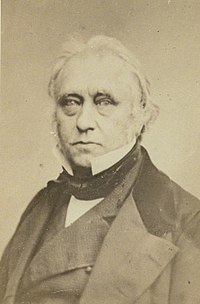Macaulayism
The term is derived from the name of British politician Thomas Babington Macaulay (1800–1859), who served on the Governor-General's Council and was instrumental in making English the medium of instruction for higher education in India.
He advocated the shutting down of all colleges where only eastern philosophy and subjects were taught, which involved introducing Indians to European ideas from the Renaissance, the Scientific Revolution and the Enlightenment.
[4]Since the second half of the 20th century, Nationalists in India have criticised Macaulay his views on Hinduism and Indian culture at large, which they claim skewed his educational policies.
[5] Speaking at a national seminar on "Decolonising English Education" in 2001, professor Kapil Kapoor of Jawaharlal Nehru University highlighted that mainstream English-language education in India today has tended to "marginalise inherited learning" and uproot academics from traditional 'Indian modes of thought', inducing in them "a spirit of self-denigration (ISO: hīnabhāvanā ).
[8] Reports and incidences of such behaviour and attitudes are also found in Thailand, Malaysia,[9] Hong Kong,[10] Philippines,[11] Japan and South Korea.
